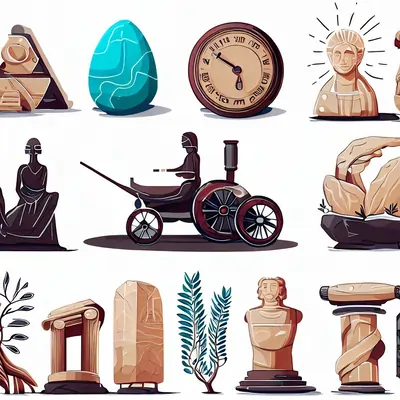Historical Milestones that Shaped Modern Nursing

- Ancient Roots of Nursing:
- Florence Nightingale and the Birth of Modern Nursing:
- Nursing during World Wars:
- Development of Nursing Education:
- Nursing Associations and Professional Organizations:
- Nursing in the 21st Century:
- Challenges and Opportunities:
Nursing is a profession that has evolved over centuries, shaped by numerous historical milestones that have paved the way for modern nursing practice. Understanding the history of nursing is not only essential for nursing students but also provides valuable insights into the challenges, achievements, and advancements that have brought us to where we are today. In this blog post, we will explore the history of nursing and discuss how you can do your nursing assignment related to this fascinating topic. So, let's embark on a journey through time to discover the historical milestones that have shaped modern nursing.
When exploring the ancient roots of nursing, we embark on a journey back in time to civilizations like ancient Egypt, Greece, and Rome. In these early societies, healthcare and nursing were fundamentally different from what we know today. Nursing, in its nascent form, was not a profession but rather a communal responsibility. Families and communities took care of the sick and injured among them.

Assignments on this topic can encourage nursing students to delve into the fascinating dynamics of these ancient societies. They can explore how caregiving roles were distributed, who the caregivers were, and what methods and remedies were employed to treat the ill. Comparing these ancient practices to contemporary healthcare systems allows students to appreciate the evolution of nursing as a structured profession.
Moreover, by understanding the ancient foundations of nursing, students can gain insights into the cultural, social, and medical influences that have shaped modern nursing practices. For instance, some ancient healing rituals and herbal remedies may have had enduring impacts on holistic healthcare.
Florence Nightingale stands as an iconic figure in the history of nursing, and her contributions during the Crimean War in the mid-19th century forever changed the face of nursing. Nursing students can dive deep into Nightingale's life and her transformative impact on the profession.
Nightingale's emphasis on sanitation, hygiene, and data-driven care was revolutionary in her time and continues to be relevant in modern healthcare settings. Her famous lamp, which symbolizes her commitment to providing care at all hours, is a testament to her dedication. Students can explore how her principles laid the foundation for contemporary nursing practices, particularly in infection control, patient care, and evidence-based nursing.
Assignments can encourage students to examine Nightingale's pioneering work in the context of today's healthcare challenges, such as infection control in the era of antibiotic resistance and the importance of data-driven decision-making in patient care.
The 20th century saw the world engulfed in two major World Wars, and nurses played pivotal roles during these tumultuous times. Nursing students can research and appreciate the remarkable resilience, adaptability, and dedication displayed by nurses in wartime.
Assignments can delve into the unique challenges nurses faced during these periods, including the chaos of triage in battlefield hospitals, the emotional toll of caring for wounded soldiers, and the limited resources available for patient care. Such assignments can highlight the indomitable spirit of nurses during times of crisis and how their experiences during the wars shaped the profession.
Moreover, students can examine the advancements in medical and nursing practices that emerged as a result of the wartime experience, such as the development of mobile field hospitals and the refinement of trauma care protocols. These insights can foster a deep appreciation for the role of nurses in emergency and disaster healthcare.
The evolution of nursing education is a critical aspect of nursing history that students can explore. It offers a glimpse into how the profession has grown and adapted over time. Students can investigate the progression from Florence Nightingale's Florence Nightingale School of Nursing to the modern nursing programs we have today.
Assignments on this topic can discuss the changing curriculum in nursing education, accreditation processes, and the pivotal shift toward evidence-based practice. Students can reflect on how the development of nursing education has influenced the competency and professionalism of nurses.
Furthermore, understanding the historical context of nursing education can help students appreciate the importance of continuous learning and professional development in nursing, as the field continues to evolve in response to emerging healthcare challenges and technologies.
Nursing students can gain a deeper understanding of the nursing profession's contemporary landscape by examining the pivotal role played by nursing associations and professional organizations. These entities, such as the American Nurses Association (ANA) and the International Council of Nurses (ICN), have had a significant impact on shaping nursing as a profession and advocating for the rights and well-being of nurses.
Assignments on this topic can encourage students to explore the historical context and evolution of nursing organizations, highlighting key milestones and achievements. For instance, they can delve into the establishment of nursing codes of ethics and standards of practice, showcasing how these guidelines have guided nursing professionals in their roles.
Moreover, assignments can emphasize the benefits of joining such organizations for aspiring nurses. Students can research the resources, networking opportunities, and career development support provided by these associations. They can also examine how active participation in nursing organizations can foster leadership skills and advocacy for important healthcare issues, ultimately benefiting both individual nurses and the profession as a whole.
In the 21st century, nursing has undergone remarkable transformations in response to technological advancements, the rise of evidence-based practice, and the emergence of specialized roles. Nursing students can explore how the profession has adapted to this changing landscape and the evolving demands of modern healthcare.
Assignments can delve into various aspects of contemporary nursing, including the integration of technology such as telemedicine and electronic health records. Students can examine the impact of these technologies on patient care, healthcare efficiency, and data security. Additionally, they can explore how nurses are harnessing technology to improve patient outcomes and streamline healthcare delivery.
Furthermore, assignments can introduce students to emerging nursing roles like nurse practitioners and nurse informaticists. These roles exemplify the expanding horizons within the field and the diverse career opportunities available to nursing graduates. By investigating these roles, students can gain insights into the specialized skills and knowledge required, encouraging them to consider alternative career paths within nursing.
To make the topic of nursing history more relatable to current nursing students, assignments can address the pressing challenges and opportunities that nurses face today. These challenges may include issues like nurse burnout, staffing shortages, and the enduring impact of the COVID-19 pandemic on healthcare systems.
Assignments can encourage students to think critically about these issues and propose practical solutions or strategies for addressing them. For example, they can research evidence-based approaches to reduce nurse burnout, explore innovative recruitment and retention strategies to combat staffing shortages and analyze the lessons learned from the pandemic to better prepare for future healthcare crises.
By tackling these real-world challenges in their assignments, nursing students not only gain a deeper understanding of the complexities of modern healthcare but also develop problem-solving and critical-thinking skills that are essential for their future roles as healthcare professionals. Moreover, it reinforces the idea that nursing history is not confined to the past; it is an ongoing story shaped by the challenges and opportunities of the present and future.
Conclusion
Studying the historical milestones that have shaped modern nursing is not only a fascinating journey through time but also an essential part of nursing education. Assignments related to this topic can help students develop a deeper appreciation for the profession and its rich history. Moreover, they can gain valuable insights into the challenges and opportunities that await them as future nurses. By connecting the history of nursing to the present, an online nursing assignment help website can assist students in crafting well-researched and insightful assignments that demonstrate their knowledge and passion for this noble profession.